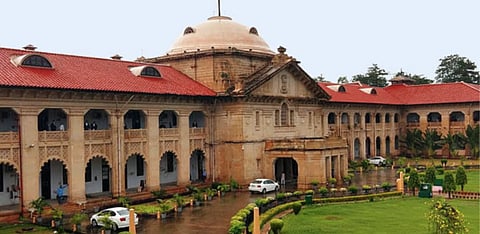

The court also asked the Union and Uttar Pradesh governments to work in tandem to make identity-related documents consistent and remove anomalies therein.
—
IN a significant judgment, the Allahabad High Court has ruled that a regulation under the Uttar Pradesh Intermediate Education Act, 1921 which seeks to, among other things, prohibit a person adopting a name disclosing their religion or caste, or change their name pursuant to a religious conversion or change of caste or change of name after marriage, infringes the fundamental right to profess and practice the religion of one's choice guaranteed under Article 25 of the Constitution.
The impugned regulation also provides that name change applications pursuant to religious conversion, or change of caste or change of name after marriage are not liable to be entertained.
The court of Justice Ajay Bhanot noted that law does not prevent giving such names at birth.
"The names given at christening can also be taken later in life. If the former are not prohibited it stands to reason that the latter cannot be proscribed. At times change of name pursuant to a change of caste or religion is part of rituals that precede the same. Prohibitions of this nature infringe the fundamental right to profess and practice a religion of one's choice guaranteed under Article 25 of the Constitution of India. Likewise, the bar on name change after marriage will interfere in the fundamental right of a person to express one's identity," Justice Bhanot held in his judgment.
The petitioner before the high court had filed an application before the state authorities to change his name from "Shahnawaz" to "Md Sameer Rao". This had been rejected by the authorities. The name of the petitioner was recorded as "Shahnawaz" in the Board of High School Examination certificate, and the Intermediate Examination certificate by the Madhyamik Shiksha Parishad issued in 2013 and 2015 respectively.
Applications seeking a change of name recorded in the high school or intermediate certificates issued by the Board are regulated by Regulation 40 of Chapter XII of the Uttar Pradesh Intermediate Education Act, 1921.
In this case, the application for name change was made by the petitioner seven years and five years after he had sat for high school and intermediate examinations respectively, as against the statutory requirement of three years from March 31 of the year in which the candidate appeared for the examination. Justice Bhanot held that in the facts and circumstances of the case, the delay by the petitioner in seeking to change his name was liable to be condoned.
He further held that a narrow approach or a rigid construction of the limitation period in Regulation 40(ग) would violate the fundamental rights of the petitioner under Articles 19(1)(a) and 21 of the Constitution. He thus read down Regulation 40(ग) to hold that the restrictions therein could not be said to be mandatory, and could be relaxed in the facts and circumstances of a case.
Besides, it was held that the restrictions contained in Regulation 40(ग) are disproportionate and prohibitory, fail the test of reasonable restrictions on fundamental rights, and infringe the fundamental right to choose and change one's name under Articles 19(1)(a), 21 and 14 of the Constitution.
Justice Bhanot opined that the petitioner's new name gives him a higher sense of self-worth, and is therefore within the scope of Regulation 40(ख).
He also quoted from an international human rights law journal paper to note that international jurisprudence has increasingly recognised "the growing importance of human rights in international law, of the obligation to recognize and respect individual identity, as well as the generality of certain human rights standards such as the prohibition of discrimination, the right to private life, and the right to a name."
"Various international instruments also vest the right to a name in every person. … Clearly the importance of a name is a universal human value and a cherished right across jurisdictions. Commonality of human values and consensus of judicial authorities often becomes the basis of universal human rights," he observed.
Allowing the writ petition, Justice Bhanot issued a writ in the nature of mandamus, commanding the respondents to allow the application of the petitioner to change his name from "Shahnawaz" to "Md Sameer Rao" and accordingly issue fresh high school and intermediate certificates incorporating the said change.
He also directed the petitioner to surrender all his public documents of identity like Aadhar card, ration card, driving licence, passport, voter ID card and so on to the competent authorities who shall register the change of name, dispose off or destroy the earlier identity documents as per law, and issue fresh documents consistent with his changed name in accordance with law.
Justice Bhanot also asked the Union Home Secretary and the Chief Secretary, Government of Uttar Pradesh, to create appropriate legal and administrative frameworks to ensure that both the Union and the state governments work in concert to achieve the end of making identity-related documents consistent and remove anomalies therein.
Click here to view the full judgment of the Allahabad High Court in Md Sameer Rao versus State of UP & Ors.